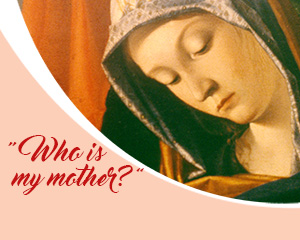“Who is my mother?”
One day, Jesus said to the crowd: “Who are my mother and my brothers [and sisters]? My mother, brothers and sisters are those who hear the word of God and do it” (cf. Mk. 3:31; Lk.8:21). This statement throws light on the contemplative activity that constructs the world and gives rise to life: it makes the desert bloom, causes people to smile, consoles hearts, open paths and build bridges. We are all called to listen to the life-generating words of Jesus and preserve them in our hearts.
But let us take a moment to satisfy our curiosity: after Mary and Joseph, who were the first ones to cross the threshold of the place where the Holy Family had “pitched its tent”? The first visitors to that site were individuals who contemplated the stars and preserved in their hearts a sense of God’s mystery. Yes, they were the humble and courageous shepherds of Bethlehem (cf. Lk. 2:8-20), who, while watching over their sheep, docilely opened themselves to the splendor of the Word.
And yet an old Jewish maxim declared that “there is no condition of life in this world as contemptible as that of a shepherd.” It is very significant that the negative judgment of history on shepherds was not adopted by the New Testament. Indeed, the evangelist Luke paints the fidelity of shepherds to their duties with the same hues he uses when speaking about the Mother of God, who preserved everything in her heart: “They were keeping watch (phyllasontes: to guard something with one’s very life) over their flocks by night.” Like Mary, the shepherds too were superb custodians (cf. Lk. 2:8; 11:28).
So the members of the family of Jesus are not those who, with veiled pride, reduce the Word of God to an object of meditation or speculation, but those who in the depths of their hearts humbly allow themselves to be shaped and guided by that Word, the primary subject of their actions and the star of their existence.
Francesca Pratillo, fsp

